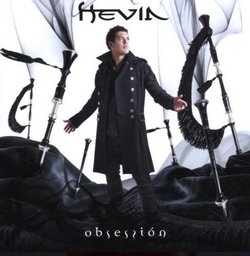| All Artists: Hevia Title: Obsession Members Wishing: 0 Total Copies: 0 Label: EMI Original Release Date: 1/1/2008 Re-Release Date: 10/19/2007 Album Type: Import Genres: International Music, Pop, Latin Music Styles: Celtic, South & Central America, Latin Pop Number of Discs: 1 SwapaCD Credits: 1 UPCs: 5099950488520, 5099950488551 |
Search - Hevia :: Obsession
CD Details |
CD ReviewsAptly Named Robert Shepard Jr. | USA | 02/18/2008 (5 out of 5 stars) "I've been a big fan of José Ángel Hevia ever since I first heard his debut album, "Tierra de Nadie", almost eight years ago. His music blends elements of his native Asturias, in northern Spain, with other forms of Celtic music, along with Spanish and Arabic motifs, and finally, electronic strains. He is a master of the acoustic Asturian bagpipes, along with a form of Midi pipes he invented himself, and a type of low whistle. The elaborate vocal harmonies, when they appear, are always very exotic and, at the same time, ancient-feeling, making the hair stand up on my arms as I'm swept away by the timelessness of it all.
Have you ever stood in a medieval castle, with the odd sense that you could slip through a crack in the coils of time and find yourself stranded in the twelfth century? That's the feeling I get uniquely from listening to Hevia, and no one else, due to his mixture of ultra-modern and ultra-ancient. The Celts are a truly ancient people, having inhabited Europe for over two thousand years, with a sense of history and legend second to none, and equaled by few. If you're familiar with Hevia's earlier works, his fourth CD, "Obsessión", may surprise you a bit. I knew what I was in for, having sampled each of the tracks on Hevia's web site. Just getting my hands on this CD became an obsession in its own right -- hardly anyone in the United States carries it, and I don't like dealing with on-line auction sites and third-party vendors. In the end, I think Amazon recognized that I was obsessively searching for the album practically every day, so they tracked it down for me. Essentially, "Obsessión" is more electronic than any of Hevia's earlier works, but I quickly got used to it, and the melodies would not leave my head. My overall favorite, so far, is "Carrandi", which features one of Hevia's trademark female choruses, singing in Asturian. If you are unfamiliar with this language, all I can say is that it is closely related to Castilian Spanish, and is a recognized regional language in Spain. I can usually decipher its written form, but have a very difficult time understanding it sung. At least, that was true in Hevia's earlier CDs. This current one has a twist: because Amazon imported it from Argentina, the only English on it is in the copyright notices. Each track has notes, handwritten, with the top line in Asturian, and, right under it, like an imperfect echo, the Spanish translation. It probably took me half an hour to figure it out. I'm assuming this is Hevia's own writing, and it took some getting used to. In particular, the handwritten letter "ñ" ("enye") looks like a "t" with a semicircle over it. According to Hevia's notes, it appears that his producing this CD was as obsessive as my attempts to find it. Hence the album's name. I'm including the track listing, since as of this writing it is not available on Amazon's page for "Obsessión": 1) Albo 2) Albandi 3) Obsessión 4) Los Mártires De Rales 5) Vueltes 6) Carrandi 7) Soy Pastor 8) Keltronic 9) The Morning Star 10) Keltic Brass 11) Taranus 12) Lluz De Domingu Besides "Carrandi", the only other track with vocals is "Albandi", this time a men's chorus, without words. "The Morning Star" appears to be inspired by a tale of a family of Icelanders in Spain attempting to track down some old friends on a ship called "The Morning Star". "Taranus", meanwhile, is the name of the ancient Celtic thunder god, though I wouldn't describe the music as thunderous. "Keltronic", as its name suggests, is highly electronic, as is "Keltic Brass". Finally, "Lluz De Domingu" ("Light of Sunday"), was inspired by a movie by José Luis Garci and has a very traditional sound to it, complete with pounding Celtic drums. If there is one complaint I have about this CD, it's that the first track sounds oddly staticky on every player I've tried so far, though perhaps that's just a side-effect of the electronic instruments. Who can say? A side note: while I've mentioned José Ángel, there are actually two Hevias featured on this CD and all the others: José's sister María José Hevia plays the Celtic drums. So, who is this CD for? If you're a die-hard Hevia fan, you're probably already obsessed with getting it. If you're curious about what Hevia might sound like, I would recommend trying "Tierra de Nadie" and "The Other Side" first. They're much easier to find in the US, and will give you a good feel for Hevia's style. The third CD, "Étnico Ma Non Troppo", was even harder for me to find than "Obsessión", so I wish you well in that search. " |

